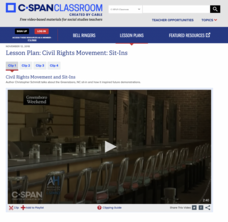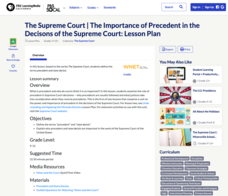C-SPAN
Civil Rights Movement: Sit-Ins
Part of the protests of the Civil Rights Movement were small scale sit-ins at lunch counters. This form of on-the-ground activism is the focus of a C-SPAN resource that includes four video-clips about the sit-ins by pupils at a lunch...
DocsTeach
U.S. v. Amistad: A Case of Jurisdiction
Just what is jurisdiction and why does it matter? A helpful activity takes academics on a journey to understand how judicial jurisdiction works. Scholars read excerpts from the Constitution and court documents to understand the process...
National Endowment for the Humanities
Oyez! Oyez! Oyez!: Simulating the Supreme Court
High schoolers have freedom of speech—or do they? Using an actual court case and research materials on the Supreme Court, young legal scholars examine the Supreme Court's role and history. Then, they argue a case the court declined to...
National Endowment for the Humanities
A Day for the Constitution
The "Constitution Day and Citizenship Day" law requires schools receiving any federal funding to provide educational programming on the history of the American Constitution. The lesson plans, materials, videos, questions, and activities...
C-SPAN
Voting Discrimination and the Effects of Shelby County v. Holder
Show students that every vote counts as they debate the federal government 's role in protecting voting rights in historically racially discriminated areas. In the Supreme Court case Shelby County v. Holder, the high court found that...
C-SPAN
14th Amendment Equal Protection Clause
Two Supreme Court cases, Plessy v. Ferguson and Brown v. Board of Education take center stage in a lesson about the Equal Protection Clause of the 14th Amendment. Class members research both cases to compare and contrast the rulings.
C-SPAN
Judicial Review and Marbury v Madison
The Supreme Court case Marbury v. Madison may not be widely recognized but the landmark case is particularly significant because it established the precedent for judicial review and that the Supreme Court had power as an interpreter of...
C-SPAN
Supreme Court Justices Research and Resumes
According to Article III, Section1 of the United States constitution, the only qualification one needs to be appointed to the Supreme Court is to demonstrate "good behavior." The president and Congress are given the power to determine...
Constitutional Rights Foundation
Elections, Money, and the First Amendment
Those who spend the most, win. Academics read informational text, participate in group discussion, and defend campaign reforms to understand the correlation between money, the First Amendment, and election results. The resource explains...
Constitutional Rights Foundation
The Census in US History
The census has been a part of the American landscape since the Constitution was written; however, it does have a history of controversy. Class members use a guided reading and simulation activity on developing census questions to...
Teaching Tolerance
Using Photographs to Teach Social Justice | Legal Action: The Supreme Court
A social justice lesson focuses on the Supreme Court case Loving v. Virginia which struck down laws that prohibited marriages between African Americans and white Americans. The lesson begins with class members examining a photograph of...
New York State Education Department
US History and Government Examination: January 2011
The presidencies of John F. Kennedy, Richard Nixon, and Ronald Reagan were defined by the Cold War. Using primary source documents and scaffolded analysis questions, pupils explore the effect the Cold War had on these presidencies. A...
New York State Education Department
US History and Government Examination: January 2012
What led to the United States Civil War? Interested historians consider a variety of political, social, and economic factors using primary sources and an essay prompt in an authentic high-stakes test. Primary sources include political...
National Constitution Center
Dred Scott v. Sanford
Dred Scott v. Sanford was a watershed moment for the country—and a key moment leading up to the Civil War. Using videos and analytical worksheets, scholars consider the facts of the case and then develop their own arguments before the...
PBS
The Supreme Court: Civil Rights and Civil Liberties
While World War II changed the international order, it also led to a fundamental shift in the concept of civil rights within the United States. Using a video and discussion questions, class members consider the effects the war had to the...
iCivics
Supreme Decision
Is the right to wear a band t-shirt included in our freedom of speech? Budding historians consider the question by using a video game. After a brief animated video, users drop in and listen to Supreme Court justices as they debate the...
PBS
The Supreme Court: The Importance of Precedent in the Decisions of the Supreme Court
People often hear the words precedent and Supreme Court together, but why? A resource on the Supreme Court includes a variety of discussion questions, handouts that guide young historians, a video about Nixon and the court system, and...
Judicial Learning Center
The Power of Judicial Review
Marbury v. Madison is arguably the most important landmark case in the history of the Supreme Court. A fact-filled lesson provides background information about the case and two others related to the concept of judicial review. Scholars...
Judicial Learning Center
Civil Rights and Equal Protection
Almost every American is familiar with the Supreme Court case of Brown vs. Board of Education. Far fewer understand the constitutional reasoning or the wide-ranging consequences of the ruling in the field of criminology. The interesting...
Judicial Learning Center
Your 1st Amendment Rights
Why should classes care about the First Amendment? An engaging lesson serves as a powerful tool for answering just that. As all four cases in the lesson relate directly to freedom of expression in schools, young scholars explore the...
Judicial Learning Center
Why Study Landmark Cases?
Why study landmark Supreme court cases? A helpful lesson offers a brief but valuable argument for the importance of these cases in the field of criminology. It introduces scholars to some key terms necessary for studying court cases and...
Judicial Learning Center
The Appeal Process
Why doesn't the Supreme Court hear testimony from witnesses? How do they complete an entire proceeding in less than two hours? A helpful lesson guides scholars of criminology through these and other questions by explaining how appeals...
Judicial Learning Center
Judicial Independence
Most people support the idea of an independent judiciary in theory until they hear about a court case that violates their principles. An informative resource explains why the concept is important. It also provides scholars of criminology...
Judicial Learning Center
The U.S. Supreme Court
How do Supreme Court justices determine which cases to consider? What happens when the Supreme Court decides not to take a case? The lesson explores important questions and others in the field of criminology. It focuses on the appeals...

























